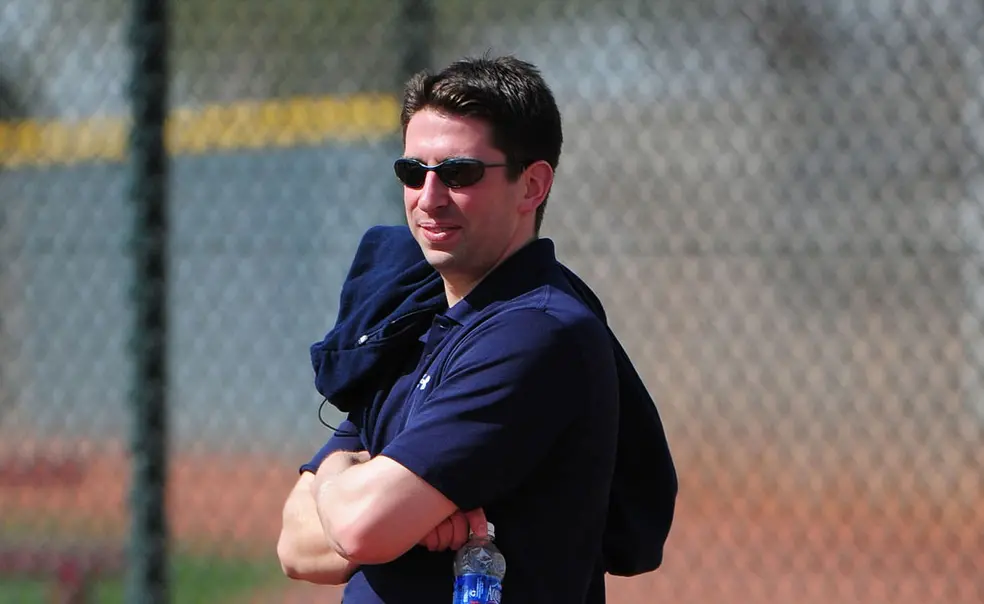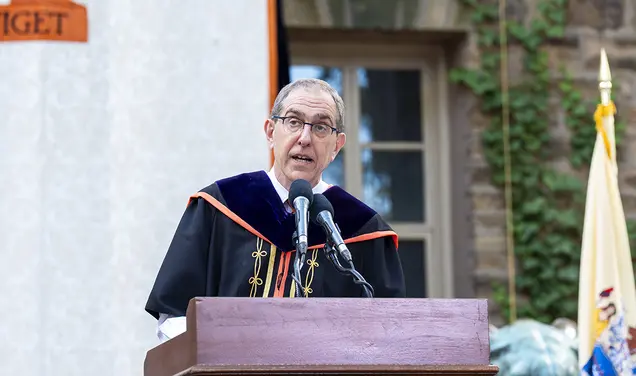Mike Chernoff ’03 Oversees Resurgent Cleveland in his First Year as G.M.
Long before Mike Chernoff ’03 was named general manager of the Cleveland Indians in October 2015, he had developed a reputation for making the best of what he had on the baseball field. At Princeton, the undersized middle infielder from northern New Jersey was no home run hitter. Instead, in tight games, the righty had a knack for dunking hits just over the head of the opposing team’s first baseman, in what his friend and teammate Jonathan Miller ’03 describes as the “Bermuda Triangle” between the first baseman, second baseman, and right fielder.
Chernoff uncorked so many of these hits that Princeton head coach Scott Bradley dubbed them “the Chernoff special.” Bradley trusted Chernoff to come through. “There was just something that led you to believe that he’s not going to back away from any situation,” he says.
Bradley had a tendency to see the best in his players, looking for strengths to cultivate, as opposed to flaws to fix, remembers Chernoff. That positive culture and the faith Bradley had in his young players, who won three Ivy League Championships between 2000 and 2003, stuck with Chernoff as he embarked on a front-office career after college.
In 2003, Chernoff started as the Cleveland Indians’ sole in-house analyst, just as the release of Moneyball by Michael Lewis ’82 was about to propel the analysis of baseball statistics to the fore.
“The Indians didn’t have an analytics department — I was the analytics department,” says Chernoff, who would make use of his Princeton economics degree to tackle problems such as how to expect a baseball player’s skills to fluctuate over time, as those skills improved with experience but diminished with age.
“He instantly became, probably, the smartest guy in the office,” says Mike Hazen ’98, who was, at the time, already working in the Cleveland Indians front office and is now in his first year as general manager of the Boston Red Sox. (Hazen and Chernoff worked under fellow Princetonian Mark Shapiro ’89, now the president and CEO of the Toronto Blue Jays, another American League playoff team this year.)
Despite being a small-market team in a sport still heavily reliant on local revenue, Cleveland has made the most of its resources and run away with the American League Central Division this year in Chernoff’s first season at the helm.
Bradley credits Chernoff’s ability to recall his Princeton baseball experience in homing in on the most important aspects of the game, some of which, like a Chernoff special, may not have a statistic associated with them.
“There are no analytics to measure character and team chemistry,” says Bradley, pointing to Chernoff’s signing of veteran first baseman Mike Napoli, a clubhouse leader, as the move that caused the Indians to gel as a team this year.
Beginning Thursday, Chernoff’s Indians take on Hazen’s Red Sox in the American League Division Series, a battle of Princeton general managers.
“The Indians are a classy, cutting-edge organization and [Chernoff’s] a main player in that, a big reason why — always has been,” says Hazen. “It’s hard not to root for those guys. For five days, I have to put that aside and try.”












No responses yet